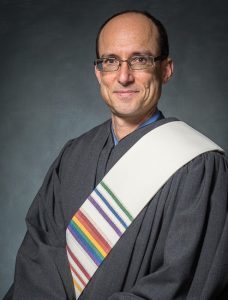
The Rev. Darryl W. Stephens
Diakonia is a strange Greek word. It is often translated as service. But diakonia means much more than simply doing things for others. It is an essential part of Christian identity and discipleship. It is about who we are and what we do as followers of Christ. Through baptism, we join not only the “priesthood of all believers” but also the “diaconate of all believers.”
New Testament translators use a wide variety of English words to convey the meaning of diakonia. The work of diakonia is described as service, food distribution, waiting at table, ministration, task or simply ministry. The person of diakonia is rendered servant, slave, helper, minister, agent, emissary, representative or deacon. Thus, the work and person of diakonia combines ordinary service with being an emissary of God! As my Lutheran colleague Norma Cook Everist says, “Diakonia is gospel action.”
Confusion arises when we try to fit diakonia into our preconceived notions of status, hierarchy and importance. Is servitude something we expect of those who are lower in rank, wealth or honor than ourselves? Or is servitude something that we participate in for the benefit of others? Is the deacon of lower status than the bishop or priest (elder)? Or is the role of the diaconate to be elevated above all other roles? For those who strive to be first in faithfulness, Jesus offered admonishment and advice.
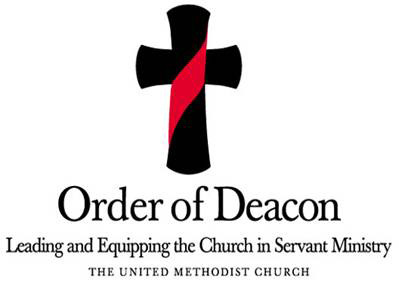
When Jesus’ disciples began to argue about who among them was the greatest, Jesus chastised them. They did not understand what it meant to be great. He used the word diakonia to explain status in the Kin-dom of God. “For who is greater, the one who is at the table or the one who serves [diakonōn]? Is it not the one at the table? But I am among you as one who serves [diakonōn]” (Luke 22:27, NRSVUE). Jesus embodied and performed diakonia through serving others at a table. Jesus was in the role of deacon, the server.
Despite Jesus’ example, we often manipulate the image of server to our own devices. We misunderstand diakonia when we try to impose or enforce diakonia on others. Slavery or indentured servitude should not be romantically depicted as a blessing, as if the ones being served are doing some sort of divinely sanctioned favor for those they oppress.
We also misunderstand diakonia when we hide ourselves through servitude, failing to love ourselves or to accept the free grace of God. Rather, diakonia serves God by serving others—not to our own neglect but to live life abundantly in Christ.
The diaconate of all believers
Diakonia is service sent by God and accountable to the church. The church is a body with many members. God invites each of the baptized to participate in the diaconate of all believers in a unique way. As Paul wrote to the church in Corinth, “there are varieties of services [diakoniōn] but the same Lord” (1 Corinthians 12: 5, NRSVUE). When I love my neighbor as myself, I am living out my discipleship to Christ. When I am sent by God and accountable to the church for my service to others, I am living out diakonia.
The church recognizes many forms of diakonia. Upon baptism, a Christian is readied for the diaconate of all believers. This call to diakonia is realized when someone is sent by and accountable to a faith community for their Christian motivated service in the church and the world.
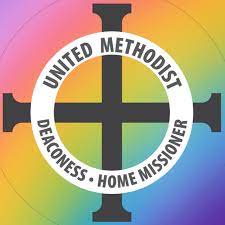
In Presbyterian traditions, lay deacons may serve as congregational trustees, for example. Some laypersons experience a lifetime call to diakonia. In The United Methodist Church (UMC), laywomen can be consecrated and commissioned as deaconesses; laymen can be consecrated and commissioned as home missioners. Together, they form a lay Order—a covenant community of support and accountability—for ministries of love, justice and service.
Some traditions have a transitional diaconate, in which a candidate is first ordained a deacon in preparation for ordination as a priest. In contrast, a vocational, or permanent, deacon is ordained for a lifetime of service in that role. Deacons serve as a bridge between the church and the world, leading the laity in ministry beyond the walls of the church. In United Methodist, Roman Catholic, Lutheran, and Anglican traditions, vocational deacons are ordained to specialized ministries, such as teaching, social work, counseling, chaplaincy, administration, music and many more!
Deacons wear a stole over the left shoulder draped across the chest and tied at the right hip. This stole symbolizes the yoke of Christ or the towel used during ritual foot washing. Liturgically, deacons assist with sacraments, read the gospel lesson, offer prayers of the people, and send forth the gathered community into the world.
An ecumenical renewal of diakonia
We are currently experiencing an ecumenical renewal of diakonia. In the 19th century, diakonia was understood mainly as Christian motivated social service, as performed by nuns and deaconesses in poor urban areas. In the 20th century, diakonia looked more like those providing economic development, sanitation, clean water and employment opportunities. In the 21st century, diakonia is focused not only on serving others but also advocating for others. The new paradigm of the World Council of Churches is one of holistic or prophetic diakonia.
Diakonia joins in solidarity with individuals and communities, empowering them to realize and utilize their own resources and gifts. Diakonia is not meant to create dependencies. Through diakonia, we build participatory communities in which true greatness is to serve others as an emissary of God. Thus, Paul taught, “we are ambassadors for Christ,” and “God . . . has given us the ministry [diakonian] of reconciliation” (2 Corinthians 5:18–20, NRSVUE). Diakonia is a call to all Christians to alleviate suffering and promote justice, peace, and human dignity.
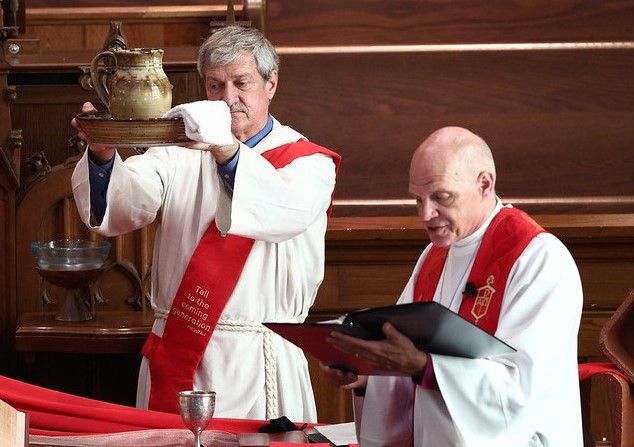
If you are experiencing a call to serve others through diakonia or would like to learn more about this form or ministry, please see these resources:
- “Ministry in the UMC” brochure: https://www.explorecalling.org/resources/
- Office of Deaconess & Home Missioner: https://uwfaith.org/what-we-do/deaconess-and-home-missioner/
- Ecumenical diakonia: https://darrylwstephens.com/diaconal-studies/resources/
- “Ep. 411: The Diaconate Call & Bivocational Ministry with Darryl Stephens,” Uncovered Dish Christian Leadership Podcast, September 13, 2023. https://youtu.be/uOjbZIophRU?si=_ysNZKlfuPVII5Ve and https://www.gnjumc.org/podcast/.
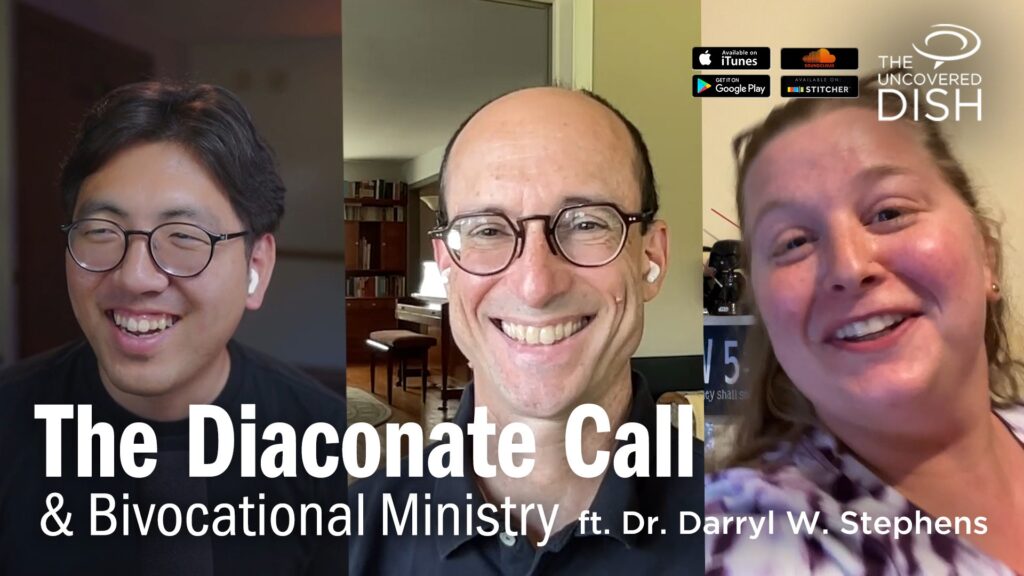
The Rev. Darryl W. Stephens, a leader among ordained Deacons, is a foremost voice on the Call to the Diaconate, as well as bivocational ministry within The United Methodist Church. Dr. Stephens, who has taught at several seminaries, directs United Methodist Studies and the Pennsylvania Academy of Ministry at Lancaster Theological Seminary. He authors the blog “Ethics Considered” at https://darrylwstephens.com/. Listen to his views about The Diaconate Call & Bivocational Ministry on the Uncovered Dish Christian Leadership Podcast.
